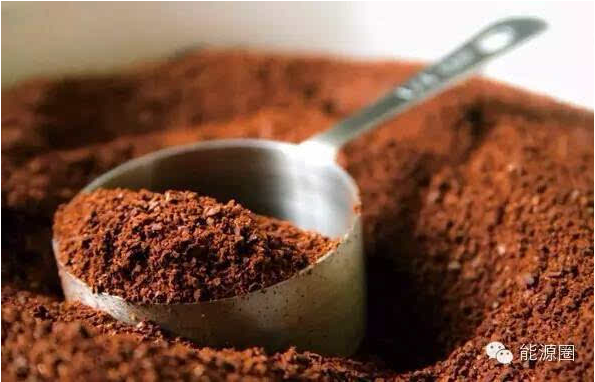Don't dump your coffee grounds: use it as supercapacitor coffee grounds for fuel

Energy circle is a coffee lover, bought a set of homemade coffee tools, and can enjoy the fragrant homemade coffee in the office from now on. But every time there is a pile of coffee grounds left, and it seems that there is no other way to deal with it but to pour it into the trash can.
The world produces more than 9 million tons of coffee beans every year, and once brewed, a large pile of rubbish is made, most of which are landfills.
However, the latest research shows that coffee grounds is a high-quality fuel, and it is too wasteful to dump it.
(the following text is compiled by Wang Diudou and fried with eggs)
Researchers in South Korea have found a way to use discarded coffee grounds as a more literal fuel, in a study in Nanotechnology. they reported the use of coffee waste to produce a carbon material full of tiny pores to increase the surface area, known as activated carbon. The new material can absorb and store methane and hydrogen, both of which can be used as fuel.
While the ability to store these fuels with this cheap material is a big step forward in making the technology more feasible, it also has an environmental advantage: methane is a harmful greenhouse gas.
This is by no means the only use of abandoned coffee grounds. As a relatively pure and essentially free waste logistics, scientists, engineers and entrepreneurs have studied various ways to take advantage of it.
Burning coffee as a low-cost fuel for several years, Nestl é has been using discarded coffee grounds from his home's instant coffee as thermal fuel. It currently uses coffee to cook its food in more than 20 factories around the world, replacing more than 800000 tons of coffee grounds that would otherwise be landfill.
In a more specific effort, London-based Bio-beans is trying to turn waste from local instant coffee producers (nearly 200000 tonnes in London and south-east England alone) into biomass particles for power generation and to heat homes with trendy biomass burners. These beans burn cleaner and contain 50% more energy than traditional wood particles. Unlike Nestl é, however, Bio-bean first removes oil from coffee, which brings us to the next point:
Turning coffee into liquid fuel Coffee beans, like most plant seeds, contain large amounts of oil that can be extracted or chemically extracted, which can then be converted into biodiesel with properties similar to conventional diesel.
The fuel can be used in standard diesel engines. Paul Joseph, CC BY
Coffee-derived biodiesel is not affected by where the coffee is grown, the type of beans or how the coffee is brewed, which is a big advantage, which means that coffee-derived fuels provide predictable and consistent energy values when burned.
Coffee grounds can also be fermented to produce ethanol or to apply extreme temperature and pressure to create bio-oils similar to crude oil. however, both processes are expensive. Biodiesel seems to be the only fuel that works on a larger scale, so Bio-beans is struggling to commercialize it.
Coffee contains a lot of valuable chemicals that can be separated and purified for very special uses, such as chlorogenic acid, a food additive that slightly lowers blood pressure; fenugreek alkaloids, which help prevent and treat diabetes and central nervous system diseases; polyhydroxyfatty acid esters used in the manufacture of bioplastics And a wide range of antioxidants that can be used medically or added to fuels and lubricants to extend their life.
Coffee compost?
This Hawaiian coffee farm has the right idea. Scot Nelson, CC BY-SA
Coffee grounds are rich in nitrogen, an important nutrient for plant growth, and some coffee shops know that they will give used coffee to their customers. This reduces their waste and can be turned into organic fruits and vegetables. what barista would say no?
Absorption of heavy metals
Coffee grounds can even effectively absorb harmful heavy metals such as chromium, copper, nickel or lead, which are often leaked from chemical plants and cause heavy losses. Under specific laboratory conditions, it has been reported that waste coffee can remove 91% heavy metal ions from the solution-a good example of potential environmental benefits.
Does anyone have coffee grounds on hand? There was a major leak at the Polishan copper mine in Canada last year. Reuters
Coffee making supercapacitor
The most complicated thing is that researchers use coffee to make supercapacitors, which can maintain more power and more charging cycles than traditional batteries, and ultra-thin porous carbon nanosheets with excellent electrical properties have been produced.
Whether it's composting in the garden at home, research in the laboratory, or even in industrial fuel production, discarded coffee obviously has a lot of uses. One thing is certain, of course we should not just lose it.
Important Notice :
前街咖啡 FrontStreet Coffee has moved to new addredd:
FrontStreet Coffee Address: 315,Donghua East Road,GuangZhou
Tel:020 38364473
- Prev

What a mess! Is drinking coffee harmful or beneficial?
What a mess! Is drinking coffee harmful or beneficial? (photo / China Times Electronic News) Coffee is one of the three biggest drinks in the world, attracting many enthusiasts, but many experts say it can fight cancer, and some experts say it will hurt the stomach, who should listen to? Coffee is the extract of coffee beans, in which there are no less than hundreds of ingredients, the core of which, of course, is caffeine, which is a kind of nerve excitement.
- Next

Now the "black face coffee shop" in Japan can experience the transformation of "black face makeup" into a hot girl.
The black-faced fashion that was popular among hot girls about 15 years ago has come back to life in Shibuya, Tokyo, Japan, Japan's Sankei Shimbun reported on October 30. Recently, with the birth of a black-faced coffee shop that allows girls to experience black-faced fashion, black-faced hot girls who have almost become extinct species can appear in front of everyone again. It is reported that the clerk in the coffee shop is on the phone.
Related
- What is the difference between Indonesian Sumatra Mantinin coffee and gold Mantinin? How to distinguish between real and fake golden Mantelin coffee?
- What does bypass mean in coffee? Why can hand-brewed coffee and water make it better?
- Unexpected! Ruixing Telunsu lattes use a smoothie machine to foam milk?!
- % Arabia's first store in Henan opens into the village?! Netizen: Thought it was P's
- Does an authentic standard mocha coffee recipe use chocolate sauce or powder? Mocha Latte/Dirty Coffee/Salty Mocha Coffee Recipe Share!
- What is the difference between Vietnam egg coffee and Norway egg coffee? Hand-brewed single product coffee filter paper filter cloth filter flat solution!
- What is the difference between sun-cured and honey-treated coffee? What are the differences in the flavor characteristics of sun-honey coffee?
- How to make Italian latte! How much milk does a standard latte use/what should the ratio of coffee to milk be?
- How to make butter American/butter latte/butter Dirty coffee? Is hand-brewed coffee good with butter?
- Is Dirty the cold version of Australian White? What is the difference between dirty coffee/decent coffee and Australian white espresso?

